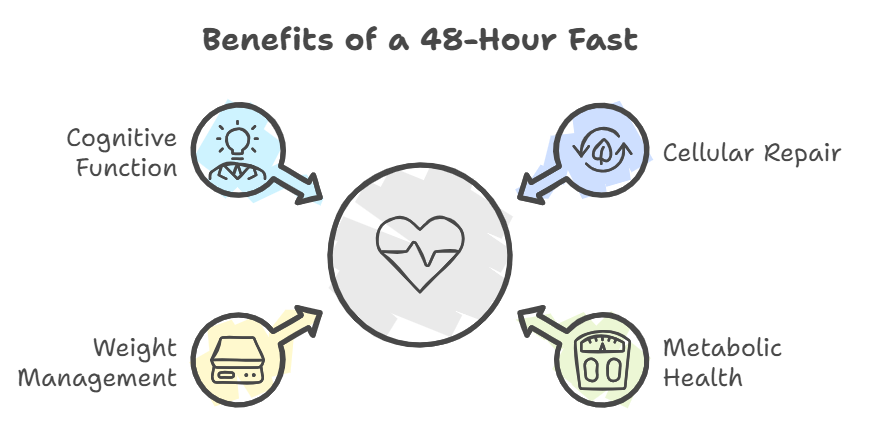Fasting has been practiced for centuries, but only recently has science begun to explore its potential. The 48-hour fast has gained popularity, offering a unique approach to wellness. This extended fasting period, done once or twice monthly, 48 hour fast benefits work both for body and mind.
I’ve experimented with various fasting protocols and witnessed the transformative effects of a 48-hour fast firsthand. It extends beyond weight loss, potentially impacting cellular health and cognitive function.
However, 48 hour fast require careful planning and, preferably, professional medical advice. For healthy, prepared individuals, the potential rewards are significant.
Understanding the 48 Hour Fast
A 48-hour fast means abstaining from calories for two full days. You can drink water, black coffee, and other zero-calorie fluids to prevent dehydration and stay hydrated.
“Fasting is not about starvation; it’s about giving your body the time it needs to heal and reset.”
Dr. Jason Fung
This fasting method is typically practiced once or twice a month, rather than weekly. Unlike shorter fasting protocols, such as the 20:4 intermittent fasting method, this extended fast allows your body to enter ketosis, burning fat for fuel instead of glucose. This metabolic shift underpins many of the 48 hour fast benefits.
The Science Behind 48 Hour Fast Benefits
Cellular Repair and Longevity
One of key 48 hour fast benefits is its potential impact on cellular health. Extended fasting initiates autophagy, a cellular cleaning mechanism. Damaged cell components are broken down and recycled.
Research shows that improved cellular repair and delayed tissue aging may promote longevity. While autophagy research is primarily in animals, the implications for human health are promising.
Metabolic Health and Insulin Sensitivity
One of significant 48 hour fast benefits is its potential to improve metabolic health. Fasting can decrease blood pressure, improve oxidative stress levels, and even lower blood sugar and improve insulin sensitivity1.
Improved insulin sensitivity is vital, as insulin resistance contributes to type 2 diabetes and metabolic disorders.
Giving your body a break from food allows your blood sugar levels and insulin levels to reset, potentially improving insulin sensitivity. This can help those who struggle with weight management to start burning stored body fat more effectively.
Weight Management
While not the primary focus, weight loss can be one of 48 hour fast benefits. Intermittent fasting may boost weight loss, though specific 48-hour fast studies are limited2.
This is likely due to the calorie deficit. However, extended fasts may help people redefine their relationship with food and adopt healthier long-term eating habits.
48 hour fast benefits: Cognitive Function and Mental Clarity
Many people report improved mental clarity after a 48-hour fast. While the mechanisms are unclear, the shift to ketosis might contribute. A study revealed an increase in metabolites linked to cognitive function after 58 hours of fasting.
This is just a single instance and more research is needed, but it’s a promising indication of the possible heart health and cognitive benefits of prolonged fasts3.
Reducing high cholesterol, improving cognitive health, and improving heart health have all been noted as 48 hour fast benefits. Longer fasts have been seen to give bigger results in some areas as well, though the longer fasts do come with a higher risk of side effects as well.

Potential Risks and Considerations
While the 48 hour fast benefits are compelling, approach it with caution. Extended fasting is not for everyone, and potential risks exist.
Side Effects
In a study, 72% of participants fasting for at least 48 hours experienced side effects. Common effects included hunger, fatigue, insomnia, and dizziness. These side effects are typically transient but can be unpleasant if you’re unprepared.
Who Should Avoid 48-Hour Fasting
Certain groups should avoid 48-hour fasting, including those with type 1 diabetes and chronic inflammation. Pregnant or breastfeeding women and those with eating disorders, certain chronic health conditions, or taking specific medications should also avoid it.
It’s important to get your doctor’s okay first. If you’re considering a 48-hour fast, talk to your primary care provider, especially with pre-existing conditions4.
How to Safely Practice a 48-Hour Fast
If you choose to explore benefit of 48 hour fast, do so safely and mindfully.
Preparation
- Start with shorter fasts, like the 16:8 method, to gauge your body’s response.
- Choose your timing wisely, starting your fast after dinner and breaking it two days later. Sleep through most of it.
- Drink plenty of fluids throughout your fasting period, such as water, black coffee, or herbal tea.
During the Fast
- Listen to your body; stop if you experience severe discomfort.
- Stay occupied to reduce hunger pangs.
- Get sufficient rest, as your body may need more sleep while fasting.
Breaking the Fast
- Break your fast slowly, gradually reintroducing foods to avoid problems. Start with easily digestible foods like soup or fruit.
- Gradually increase intake over the next two days. Reintroduce food in reasonable portions for a while after longer periods of fasting.
- Monitor how you feel, paying attention to energy levels, digestion, and well-being.
Comparing 48-Hour Fasts to Other Fasting Methods
While beneficial, the 48-hour fast isn’t the only option. Let’s compare it with other protocols:
| Fasting Method | Duration | Frequency | Potential Benefits | Challenges |
|---|---|---|---|---|
| 48-Hour Fast | 48 hours | 1-2 times per month | Benefit of 48 hour fast: Autophagy, metabolic reset, potential weight loss | Hunger, fatigue, requires willpower |
| 16:8 Method | 16 hours daily | Daily or several times per week | Improved insulin sensitivity, easier to maintain | Limited eating window, social eating challenges |
| 5:2 Diet | 2 days of restricted calories (500-600) per week | Weekly | Potential weight loss, metabolic benefits | Hunger on fasting days, calorie counting |
| 36-Hour Fast | 36 hours | Once per week or less | Similar to 48-hour fast, but slightly less intense | Still challenging, but more manageable for some |
Each method has pros and cons. Finding the right fit for your lifestyle and health goals is crucial. Shorter fasts, for instance, can make it easier to maintain a healthy fasting eating pattern.
Many shorter fasts in a fasting period, spread throughout non-fasting days, may have just as much impact over time as an intermittent fasting eating pattern with a few longer fasts included5.
Real-Life Experiences with 48-Hour Fasting
For a personal perspective, I spoke to people who have 48 hour fast benefits:
Sarah, a 35-year-old marketing exec, was surprised by her clarity after a 48-hour fast. She now fasts monthly to reset her eating habits.
Mike, a 42-year-old teacher, wanted to lose weight. But, he now values a better relationship with food more. He is now more mindful of his eating patterns.
Elena, a 28-year-old fitness instructor, was concerned about energy levels. Her energy rose after an initial dip. She had better focus and recovered faster from workouts.
These examples show diverse 48 hour fast benefits. Individual responses to fasting differ. Extended fasting may help with inflammatory bowel disease, rheumatoid arthritis, and high cholesterol. It may also boost weight.
Integrating 48 Hour Fast Benefits into a Healthy Lifestyle
Treat 48-hour fasting as part of a holistic approach to well-being.
- Balance is key; don’t rely solely on fasting. Eat nutritiously and exercise regularly on non-fasting days. Track your calories and adjust your nutrition. Do this on fasting and non-fasting days. It’s crucial to know which foods are beneficial when fasting. So, focus on being smart about this.
- Listen to your body. Postpone fasting if you’re unwell or stressed. Adjust as needed.
- Prioritize nutrient-rich whole foods when not fasting.
- Hydration is essential, especially when fasting. Drink zero-calorie fluids and aim for 8-10 glasses of water daily.
- Manage stress through meditation or yoga. Fasting can stress the body, requiring relaxation balance.
- Sleep is crucial. It helps with tissue repair and fat burning. And, plenty of sleep makes fasting easier.
- Journal your experiences to monitor physical and mental feelings. Optimize your fasting practices based on these notes. Many fasters say intermittent fasting has helped them. It has lowered their heart rate, improved their sleep, and boosted their energy on non-fasting days.
The goal is to enhance wellness, not punish yourself or fix bad habits. Various fasting methods have many benefits. They can help with chronic conditions, reduce inflammation, and lower oxidative stress.
Frequently Asked Questions
How many days of fasting to see benefits?
The time to see results varies based on the person and specific benefits sought. Some studies show benefits like better insulin sensitivity after 12-16 hours. However, effects like autophagy might require 24-48 hours, based on animal research. Responses vary; experiment to find what works best.
How long should I fast to cleanse my body?
The idea of a “cleanse” through fasting is debated scientifically. Your body naturally detoxifies through the liver and kidneys. Fasting may aid these by resting your digestion and potentially initiating autophagy.
Many find a 24-48 hour fast useful. Consult your primary care provider before fasting for detoxification. If you have health issues, like inflammatory bowel disease, avoid extreme diets.
What are the benefits of fasting for 4 days?
Long fasts, like 4 days, have stronger effects. They boost autophagy and cause bigger metabolic changes. They also reduce inflammation and improve cell regeneration. However, such fasts increase risks and need strict medical supervision. The 48-hour fast offers similar benefits with fewer risks.
Conclusion
48 hour fast benefits include repairing cells, boosting metabolism, and improving focus. It’s a unique method for a body and mind reset, promoting health and longevity.
Approach 48-hour fasting cautiously. While effective, it’s not for everyone and carries risks. Consult your primary care physician before fasting, especially such an intensive one.
Fasting is a single component within wellness. For best results, pair it with healthy habits: a balanced diet, exercise, stress management, and enough sleep.
Listen to your body, adjusting as needed. Individual responses vary. Whether or not you try 48-hour fasting, make informed health decisions. Be curious and open-minded. Listen to your body. It will help you manage your nutrition and wellness.
Small Step, Big Impact
If you’re ready to try a 48-hour fast, start by planning your meals before you begin, stay hydrated, and listen to your body. Fasting is a gradual process—don’t push yourself too hard.
Listen to this article
This is an AI generated Podcast version of the article.
- https://pmc.ncbi.nlm.nih.gov/articles/PMC8839325/[↩]
- https://www.hopkinsmedicine.org/health/wellness-and-prevention/intermittent-fasting-what-is-it-and-how-does-it-work[↩]
- https://www.medicalnewstoday.com/articles/323605[↩]
- https://honehealth.com/edge/48-hour-fast/?srsltid=AfmBOorvbD04Ozh__3RTHRk3qJNYmoIpzxsZ1tb5eMIbFQYZDnP4f3fV[↩]
- https://www.washingtonpost.com/wellness/2024/03/18/intermittent-fasting-time-restricted-eating/[↩]



